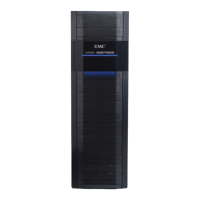26 VNX5700 Hardware Information Guide
System component description
You use a dual 2U SPS when a 4U DAE with Flash drives is used in a Vault drive
configuration. Otherwise, the dual 1U SPS is used with the 2U or 3U DAE as the Vault
drive.
1U SPS rear view
The Block and File (Unified) VNX5700 platform includes a dual 1U, 1.2-kilowatt standby
power supplies (SPSs) to maintain power to the Block and File (Unified) VNX5700 platform
SP during power loss. Within the SPS, a built-in DC battery pack is charged by way of an
AC-DC converter. AC input power from the power distribution unit (PDU) goes into the SPS
AC power inlet to the AC-DC converter. This converter then converts the AC power to DC
power, which is then stored into the built-in DC battery pack. When emergency power is
needed by the Block and File (Unified) VNX5700 platform SP, a second DC-AC converter
inside the SPS takes the DC power from the DC battery pack and then converts it to AC
power. This AC power then goes from the SPS AC power outlet to the Block and File
(Unified) VNX5700 platform SP. Looking from left to right, Figure 14 on page 27 shows an
example of the rear view of two SPSs or dual 1U SPS (B and A, respectively).
SPS failure functionality
Both the 1U and 2U SPS perform the same functions.
If AC power fails, the SPS provides backup power until the SP has flushed its write cache
data to the DAE disks. The SP then shuts off SPS power. If the cache flush has not
completed within 90 seconds—more than enough time to flush a full cache—or if the SP
has failed, then the SPS shuts down to prevent a deep discharge. If no AC input power is
available and the SPS is shut down, all the status lights will be off.
The output voltage, when the SPS is in the On-Line state, is a straight pass-through of the
AC-line from inlet to outlets. When in the On-Battery state, the output voltage shall be at
an AC level within the specified limits (see the SPS battery LED in Table 11 on page 28).
When power returns, the SPS starts recharging the DC battery pack. It might reach a state
of full charge relatively quickly. If power remains off for a long period—days or weeks—the
DC battery might require more time to charge fully.
11
The storage processor will not use
the write cache unless it detects at least one fully charged SPS.
Battery lifetime depends on the number of discharge cycles and the depth of discharge. In
a typical environment, a battery pack can last 3 to 5 years. The DC battery pack lifetime is
shorter in locations that have frequent AC outages.
11. After a full power outage, an SPS typically requires 45 minutes or a maximum of 75 minutes to
charge. To charge the SPS after being off-line usually requires at least 2 hours.

